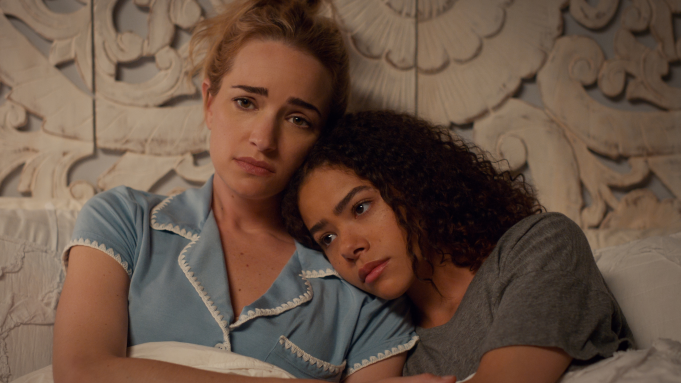
Ginny & Georgia might have started off as a stylish teen drama with Gilmore Girls-esque banter, but the show has proven it isn’t afraid to deal with more serious subject matter. From teens struggling with their mental health and abusive exes to the emotional weight of reproductive choices, the latest season tackles heavy subjects with unflinching honesty.
Netflix’s Ginny & Georgia has always balanced sharp wit with simmering drama, but Season 3 takes a bold and emotionally raw leap into deeper, darker territory. This season shows us how much the characters and the show itself has matured to un apologetically address the complex realities of trauma, mental illness, abuse, and young adulthood.
This season isn’t just intense — it’s a deep dive into the emotional undercurrents that have long haunted the show’s characters, offering a more nuanced portrayal of their pain, coping mechanisms, and need for healing. Which is why it is one of the series’ most important seasons yet.
Spoilers ahead for Ginny & Georgia Season 3
Ginny’s Healing Journey from Self-Harm

Courtesy of Netflix
Marcus and His Battle with Depression and Alcohol

Courtesy of Netflix
One of the most powerful story arcs this season is Marcus’s struggle with depression, portrayed by Felix Mallard, which ultimately drives him to use alcohol as a coping mechanism. Teen boys are rarely given the space in media to break down, to isolate, to spiral. But Marcus does — and it’s not pretty, packaged, or romanticized. Ginny & Georgia has dealt with the subject of men’s mental health very well. His struggle is internal, marked by withdrawal, irritability, and an inability to articulate what he’s feeling. Which is something we see his mother constantly struggling with. In one particularly painful and powerful moment when Marcus returns home drunk, she asks him “Do you hate us?” to which he replies, “No, I hate me.” Which is something that people suffering from depression can relate to.
The relationship between Ginny and Marcus becomes strained not just because of drama, but because mental illness erodes their connection. The show allows Marcus to be quiet in his pain — to not know how to fix it — and still asks us to care. Towards the end of the season, we learn that Marcus has been drinking at school, home, and pretty much whenever he can, which results in his parents sending him to rehab. His scenes are some of the most powerful in the season, offering a realistic look at what it means to live with depression and how you cope with it when you’re still trying to figure out who you are.
Georgia’s Past and the Lingering Fear of Gil

Courtesy of Netflix
In season 2, we were shown exactly who Gil played by Aaron Ashmore was and how abusive he had been towards Georgia throughout a series of flashbacks as well as the culminating episode of season 2 which resulted in Gil getting shot after attacking Georgia. With Gil back in the picture this season, a key aspect that we see her dealing with, besides having been arrested, is her unhealed trauma, especially when it comes to Gil. While season 2 gave us glimpses of what Georgia had been through, Season 3 makes the impact of that abuse more visceral. When Gil is granted custody of Austin, played by Diesel La Torraca, while Georgia is arrested, her fears resurface, only this time for her children. The presence of Gil looms like a shadow. Her fear isn’t just about physical harm — it’s about the psychological grip that Gil still holds on her.
Things comes to a head in one moment when we see Gil physically grab Ginny in a moment of anger — We can see how the show handles both this scene and this subject with care, as we see Georgia’s worst fears realised. The show showcases how trauma doesn’t disappear once someone escapes an abusive situation.
Abby’s Battle with Bulimia

Courtesy of Netflix
Season 3 doesn’t stop at emotional trauma — it also tackles physical and psychological health through Abby’s battle with bulimia, portrayed by Katie Douglas. Abby’s struggle with body image issues isn’t necessarily new to the show. In Season 1, Abby is shown taping her thighs with duct tape beneath her jeans to create a thigh gap, a stark example of body dysmorphia. Her eating disorder and dysmorphic behavior carry into Season 2, though often portrayed more subtly. It wasn’t until Season 3 that this behaviour was finally addressed.
The way Ginny & Georgia handles her eating disorder is quite different from your regular “You need help” situation, while not all that sensitive in addressing the issue, the show does show how her friends support her and don’t judge her in any way, which leads to a trauma bonding session between Ginny, Abby and Norah. In showing both the secrecy and the guilt that often accompany bulimia. Rather than using it as a plot device, the show gives Abby the space to feel shame, and ultimately, to open up to her friends. It’s a rare depiction in teen television — one that doesn’t glamorize or trivialize the seriousness of eating disorders.
Ginny’s Abortion

Courtesy of Netflix
Teenage pregnancies are not new to teen dramas, but the subject of abortion is rarely touched on. Ginny’s abortion is one of the most emotionally charged moments of the season, not because of its shock value, but because it’s portrayed with honesty, maturity, and care. The show neither shames her nor paints her decision as easy — instead, it treats her choice with the gravity it deserves. We see Ginny wrestle with fear, guilt, and relief. We see her seek support, and crucially, we see her get it. In this episode, we see her dad, Zion played by Nathan Mitchell, really be there for her, despite their current differences, since her mom, who is on house arrest, can’t be. The show doesn’t frame her abortion as a scandal or tragedy — it frames it as a deeply personal decision made by a young woman who’s learning to take control of her own narrative. In today’s climate, that message is not only powerful — it’s necessary. This storyline was not only a very smart addition to the show by the writers, but a very bold one.
The Weight of Generational Trauma

Courtesy of Netflix
Across all these storylines lies a common thread — the weight of trauma passed down, shared, and sometimes silently endured. Georgia’s secrets have shaped Ginny’s life in ways neither of them fully grasps, and as Ginny begins to confront her own pain, the show asks a difficult question: Can we ever truly break free from the past? Season 3 doesn’t offer easy answers. Instead, it shows us the mess: therapy sessions filled with silence, arguments rooted in fear, hugs given too late. But there’s also hope — in friendship, in family, in the choice to keep going even when everything feels broken.
Ginny & Georgia Season 3 isn’t afraid to make viewers uncomfortable. It forces us to sit with its characters in their darkest moments, to empathize with their choices, and to understand that healing is neither linear nor quick. It’s a brave season — intense, heartbreaking, and more emotionally grounded than ever before. By tackling mental health, abuse, eating disorders, and reproductive autonomy, the show has evolved beyond its early comparisons. It’s no longer just a quirky coming-of-age story. It’s a survival story, one that is important to watch, especially now, one that many viewers, especially young women, will see themselves in.
Watch the trailer for Ginny & Georgia season 3 here, now streaming on Netflix
Fangirl and Writer with a huge passion for entertainment.














